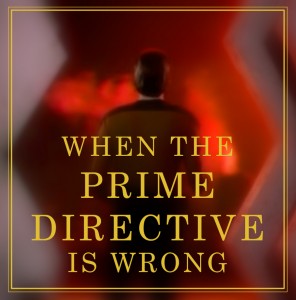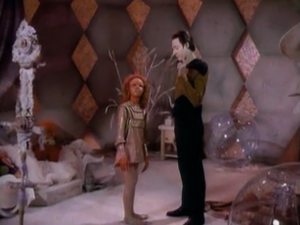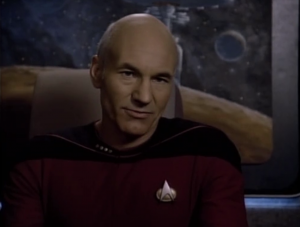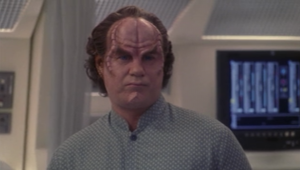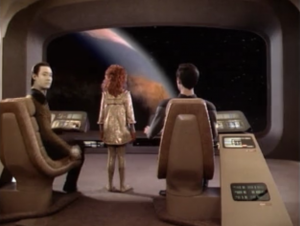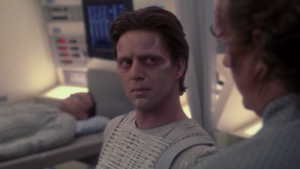Comic book artist and guest Let’s Watch Star Trek writer Matt Sheean posits that Star Trek gets the Prime Directive wrong when it comes to situations involving world-wide catastrophe.
The Prime Directive, for those of you who have been deep in the Kolinahr for the last fifty years, is the guiding principle of interstellar exploration for Starfleet. It states that no member of Starfleet shall interfere with the internal development of an alien society. There should be no contact with pre-warp societies at all, since the introduction of such dramatically advanced technology or alien ideologies could not but interfere with the development of a society. During the course of Star Trek’s various series, the crews encounter a wide variety of situations that are rightly guided by the Prime Directive. However, there are a number of situations where the characters find themselves deciding how to apply the Directive when a world-wide catastrophe is occurring in a pre-warp civilization, and it’s my contention that absolute adherence to the Directive is wrong. I’ll be looking at this particular application of the Prime Directive in light of the way it is presented in the Next Generation episode “Pen Pals” and the Enterprise episode “Dear Doctor”.
PEN PALS
Understandably the most interesting sorts of situations for television are the sorts in which the application of the Prime Directive is unclear. In “Pen Pals”, our first episode today, Data acts like a creepy internet chat room guy and covertly communicates with an underaged member of an underdeveloped society. This by itself is sketchy, even though Data has concealed his identity from his pen pal. The pal in question is a little girl on a planet with probably the same technology as earth in the mid-nineties, so she apparently assumes that Data is just some guy on the local BBS. A problem develops when the crew of the Enterprise realize her planet is subject to imminent destruction due to the unstable nature of the region of space they are in. Picard chastises Data for chatting with the unwitting alien kid and a discussion ensues as to whether or not aiding the people of this planet would violate the Prime Directive.
Three responses are given to this conundrum, two of them are reasons why the Prime Directive does apply and one why it does not. The first is argued by Worf and Picard, who both defend the position that the Prime Directive applies absolutely. Picard ends the discussion by pointing out that none of the reasons given throughout the discussion are sufficient for violating the Prime Directive in that they are not rational reasons for disobeying it. There is a problem with Picard’s position, but I’ll deal with that after talking about “Dear Doctor”!
The second reason for sticking with the Directive is given by Riker. As he puts it, it sounds kind of silly. He suggests that there is some reason that this catastrophe is happening and that intervening could violate some cosmic purpose. If we take him to be talking about some divine act, then his argument is patently awful. In the absence of a special revelation from such a divine agent, there is no other reason to think this is the case. There is, however, a more charitable way to read Riker here. This is to say that the evolutionary forces at work in the world tend to eliminate dysfunctional elements, and that the consequences of prolonging the existence of this planet and its society might be worse than letting it end naturally, as terrifying as that end might be. This argument still strikes me as horribly wrongheaded, since the consequences remain an entirely unknown factor. Admitting some sort of cosmic Darwinian purpose, but treating the Enterprise’s involvement as separate from that larger mechanism is unwarranted. Troi makes this point, more or less, in one of her rare moments of usefulness. Picard’s final argument concerning the arbitrariness of Pulaski’s sympathy also strikes me as undercutting Riker’s reason for obeying the Prime Directive.
The dissenting argument comes from Pulaski and LaForge. LaForge mostly scoffs at Riker, and both he and Pulaski offer little more than emotional reasons for violating the Prime Directive. When confronted with the absolutism of Worf and Picard, Pulaski calls it cowardly and does quite a bit more than imply that they are unsympathetic jerks. Unfortunately, hand-wringing and name-calling just don’t count as arguments.
I think the power of this scene comes from the fact that, naturally, most people will sympathize with Pulaski’s moral outrage. How can Picard and Worf be so cold?! How can Riker be so obtuse?! This whole sentiment is destroyed by Picard’s calm reason in the end. After Picard points out that the reasons given by the others for violating the Prime Directive are emotional and arbitrary we’re left with nowhere to go. Given what has been presented in the discussion, we are left with Picard and Worf being in the right. The cold, harsh light of Reason has doomed Data’s poor little Pen Pal to death! Then the plot turns as they all hear the little girl’s cry for help over the communication system. Picard determines that they are allowed to act upon such a direct request, and they save the planet.
DEAR DOCTOR
This episode is appropriate here, because it functions as a sort of origin myth for the Prime Directive. Captain Archer involves the Enterprise in a humanitarian project with an alien society that, unbeknownst to the crew, is kinda racist. Doctor Phlox is there the whole time wagging his finger condescendingly and going on about how where he’s from they know not to get involved with other folks’ problems. On the planet in question there are two people groups. One is hip and advanced, but has some genetic problems that will soon result in their extinction. The other is fecund but, by all appearances, sort of unintelligent. Ultimately Phlox discovers that the less developed species is, ironically, the key to curing the more developed group on the planet. After much deliberation and discussion and wish-washing and stuff, Archer decides that it’s totally unethical to give them the cure. Instead he leaves them with space aspirin to help them die out more comfortably. The reason given for this dramatic decision is just a more elaborate version of the Riker reason mentioned above. Phlox says that evolution is a fundamental scientific principle and that acting to circumvent it is essentially unethical. Who knows why he’s a doctor, but obvious objections aside, we’ve already seen why the Riker reason just doesn’t work. Perhaps Phlox is something of a Natural lawyer, though. Maybe he subscribes to an Aristotelian approach to morality, and he thinks that it’s inadvisable to act contrary to one’s nature. It should be fairly clear that the disease present in the species he is investigating is a disease just because it results in an obstruction of the natural processes essential to them. Why say that it’s the evolutionary process rather than the processes intrinsic to the species that is morally significant? Phlox certainly doesn’t say, even though this is a pretty important question for his moral theory to answer. Aside from that, when did ‘fundamental scientific principles’ ever grant themselves any moral import? Here is where Archer says, “My dear Phlox… Are you familiar with David Hume?”
Another important objection to the Riker/Phlox position is that it is consequentialist. Their argument goes something like “we should not do x because y might/will happen.” A big problem with this line of thinking is that the question we are asking about the action gets shifted to the consequence. We still have to explain why the consequence is good or bad. In Phlox’s case, if saving the once race means holding back the other, how is it even possible to decide that is the better scenario than one dying and the other flourishing? What explains which consequence is better? Certainly, whatever explains that will not be another consequence. It should be kept in mind that they are, of course, characters and not mere stand-ins for philosophies. It would, however, be nice if now and then such characters were a little more sophisticated than sophistical.
THE PRIME ADMONITION
Now, after all this, I’ve only established that all but one of the reasons given for obeying the Prime Directive are bad, and that no one presented a good argument for disobeying the Prime Directive either. This, however, doesn’t leave us with a reason for either following or discarding the rule. I think that there is good reason for disobeying the Directive in the situations presented by both episodes. First, I will get Picard’s argument out of the way, though. If the Prime Directive applies absolutely, and intervening in the “Pen Pals” situation is a violation of it, the conclusion from these two premises is that the Enterprise should not intervene. This of course goes for both situations. Does Picard give us any positive reasons to think that the Prime Directive is absolute? Not that I can tell. His argument is ultimately just a defense of the Prime Directive against the positions advanced by his interlocutors. This makes for good television, certainly, since we are left with a stalemate in the debate. Imagine if Picard had reasoned all the way to how the conflict should be resolved and the episode ended in the same manner. There wouldn’t be much drama there. However, his argument, as an argument, only repels the arguments advanced against the application of the Prime Directive in the situation presented. His defense of the Prime Directive ultimately takes the Prime Directive for granted as a rule without offering any clear definition for it. If the Prime Directive does apply to all situations, though, it must be a real universal moral principle and not simply a helpful legal convention.
Is the Prime Directive a real, universal moral principle? Here I think the answer is clearly no. Following Kant, we can ask what maxim the crew is acting upon by obeying the Prime Directive in each case to determine whether or not it has categorical or merely legal force. In Pen Pals, the argument runs something like this. Saving the aliens involves contact with them, the Prime Directive forbids contact, therefore we should not save them. In the event that we are given a choice in which the violation of a rule involves the destruction of an entire people group, we should certainly examine that rule! The first question to ask is what the rule is for. Why is it that the Prime Directive exists?
Here an analogy might help. It is probably a good idea for me to never enter my neighbor’s house uninvited, because it is his property and I have no ownership which gives me right to enter of my own accord. This is probably a good rule in general, that one should never enter another’s house uninvited. Is it universally the case that one should never enter another’s house uninvited? What if such a rule of propriety were followed if, for example, we saw, through a window perhaps, someone choking on their dinner. It seems silly to say, “for the sake of propriety, I should let that person die.” What is propriety for, but to preserve the dignity of persons? Put this way it is even sillier, “to preserve their dignity I should allow them to lose the condition for it, which is life.” Dignity or a lack thereof is not a property of the dead.
I think this provides a good analogy to the Prime Directive. It exists primarily as a barrier to prevent the violation of the internal development of other species. We can see that the rule “no one should ever enter another’s house uninvited” is merely a prudential rule that is most often the case but not universally the case. When talking about the Directive, we can ask whether or not violating the internal development of a species is universally wrong. Presumably such a rule must take into account some good, namely that of the crew and the flourishing of the alien species. In the case of Pen Pals and Dear Doctor the act of saving either species involves a very low cost to the ship and crew, so the question of the good of the crew is mitigated. In both episodes, deciding to act on the Prime Directive is to say, “In order to refrain from affecting the internal development of this civilization, we will let them die.” But what is intrinsically wrong with affecting a civilization such that it would be worse than saving them? Is it because interfering with their development would harm them? If we formulate the decision considering the good of the aliens it sounds even worse for the Prime Directive. “For the flourishing of (or to avoid harming) these aliens, we should not prevent their extinction.” That the Prime Directive does not pass the test of reason with respect to intervening to save species from cataclysmic events, I think, suffices to prove that it should not be invoked in such situations.
Matthew Sheean has drawn for Adventure Time and for Prophet by Brandon Graham and Simon Roy. He is the co-creator of the Expansion series with Malachi Ward.

